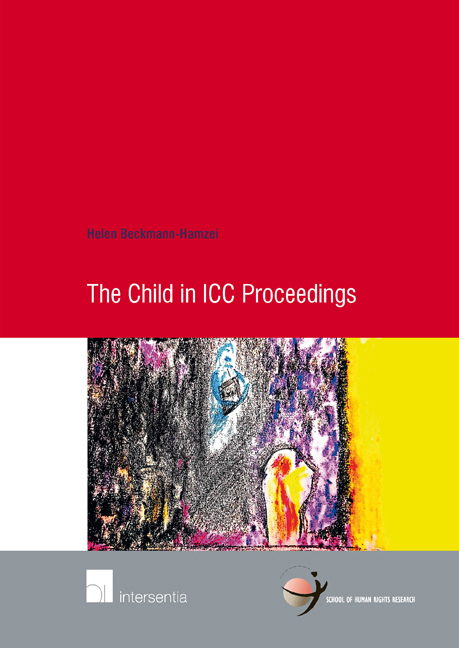Book contents
- Frontmatter
- Acknowledgments
- Contents
- List of Abbreviations
- Introduction
- Part I The Child in International Criminal Proceedings
- Chapter 2 The Child Witness
- Chapter 3 The Child Victim
- Chapter 4 The Child Perpetrator and the Child of a(n) (alleged) Perpetrator
- Part II The Child in International Reparation Practice
- Part III Concluding and Comparative Evaluation
- Summary
- Samenvatting
- Selected Bibliography
- Overview of Legislation
- Overview of Cases
- Curriculum Vitae
- Titles Published in the School of Human Rights Research Series
Chapter 2 - The Child Witness
from Part I - The Child in International Criminal Proceedings
Published online by Cambridge University Press: 12 December 2017
- Frontmatter
- Acknowledgments
- Contents
- List of Abbreviations
- Introduction
- Part I The Child in International Criminal Proceedings
- Chapter 2 The Child Witness
- Chapter 3 The Child Victim
- Chapter 4 The Child Perpetrator and the Child of a(n) (alleged) Perpetrator
- Part II The Child in International Reparation Practice
- Part III Concluding and Comparative Evaluation
- Summary
- Samenvatting
- Selected Bibliography
- Overview of Legislation
- Overview of Cases
- Curriculum Vitae
- Titles Published in the School of Human Rights Research Series
Summary
INTRODUCTION
Witness testimony in international criminal proceedings is a crucial but not unproblematic means by which evidence is provided. While the criminal prosecutions before the Nuremberg Tribunal largely relied on documentary evidence, a shift to using eye-witness testimony occurred before the later established international courts and tribunals.
Child witness testimony can be expected in international criminal proceedings when children are the direct victims of the crimes that are prosecuted. A child may also be able to provide insider information on other alleged crimes as a result of his or her specific and unique knowledge. It will be analysed in this chapter whether child witness testimony might encounter additional procedural difficulties compared to adult testimony which might deem it necessary that child-sensitive procedural treatment is provided for. This chapter presupposes that adult testimony prevails in proceedings which do not entail indictments of child focused crimes or in proceedings where crimes have been charged about which children cannot provide insider information. This means that child witness testimony is expected especially in cases in which, for instance, the recruitment of child soldiers below the age of fifteen years is charged. And indeed, as it will be seen, children, more specifically (alleged) former child soldiers have testified at the different international courts and tribunals.
The conflict in the Democratic Republic of the Congo is known for the tremendous numbers of child soldiers. The first case before the ICC is unique as the ICC Prosecutor chose to charge Thomas Lubanga Dyilo solely with the crime of recruitment. This prosecutorial decision underlines that the Prosecutor deemed it necessary to focus on crimes committed towards children in armed conflict. Calling children to the witness stand in such cases seems to be considered a conditio sine qua non and inherent to a prosecutorial strategy in order to prove the charged crime. Such practice alludes that first-hand evidence from former child soldiers is likely to constitute one of the most direct methods of proof.
- Type
- Chapter
- Information
- The Child in ICC Proceedings , pp. 31 - 78Publisher: IntersentiaPrint publication year: 2015



